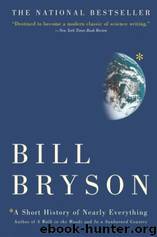Bill Bryson by A short history of nearly everything

Author:A short history of nearly everything
Language: eng
Format: mobi
Tags: Science
ISBN: 9780767908184
Publisher: Random House, Inc.
Published: 2004-09-14T10:00:00+00:00
20 SMALL WORLD
IT'S PROBABLY NOT a good idea to take too personal an interest in your microbes. Louis Pasteur, the great French chemist and bacteriologist, became so preoccupied with them that he took to peering critically at every dish placed before him with a magnifying glass, a habit that presumably did not win him many repeat invitations to dinner.
In fact, there is no point in trying to hide from your bacteria, for they are on and around you always, in numbers you can't conceive. If you are in good health and averagely diligent about hygiene, you will have a herd of about one trillion bacteria grazing on your fleshy plains—about a hundred thousand of them on every square centimeter of skin. They are there to dine off the ten billion or so flakes of skin you shed every day, plus all the tasty oils and fortifying minerals that seep out from every pore and fissure. You are for them the ultimate food court, with the convenience of warmth and constant mobility thrown in. By way of thanks, they give you B.O.
And those are just the bacteria that inhabit your skin. There are trillions more tucked away in your gut and nasal passages, clinging to your hair and eyelashes, swimming over the surface of your eyes, drilling through the enamel of your teeth. Your digestive system alone is host to more than a hundred trillion microbes, of at least four hundred types. Some deal with sugars, some with starches, some attack other bacteria. A surprising number, like the ubiquitous intestinal spirochetes, have no detectable function at all. They just seem to like to be with you. Every human body consists of about 10 quadrillion cells, but about 100 quadrillion bacterial cells. They are, in short, a big part of us. From the bacteria's point of view, of course, we are a rather small part of them.
Because we humans are big and clever enough to produce and utilize antibiotics and disinfectants, it is easy to convince ourselves that we have banished bacteria to the fringes of existence. Don't you believe it. Bacteria may not build cities or have interesting social lives, but they will be here when the Sun explodes. This is their planet, and we are on it only because they allow us to be.
Bacteria, never forget, got along for billions of years without us. We couldn't survive a day without them. They process our wastes and make them usable again; without their diligent munching nothing would rot. They purify our water and keep our soils productive. Bacteria synthesize vitamins in our gut, convert the things we eat into useful sugars and polysaccharides, and go to war on alien microbes that slip down our gullet.
We depend totally on bacteria to pluck nitrogen from the air and convert it into useful nucleotides and amino acids for us. It is a prodigious and gratifying feat. As Margulis and Sagan note, to do the same thing industrially (as when making fertilizers) manufacturers must heat
Download
This site does not store any files on its server. We only index and link to content provided by other sites. Please contact the content providers to delete copyright contents if any and email us, we'll remove relevant links or contents immediately.
Bad Pharma by Ben Goldacre(2729)
How To by Randall Munroe(2474)
The Book of Numbers by Peter Bentley(2404)
Aliens by Jim Al-Khalili(2382)
A Short History of Nearly Everything by Bryson Bill(2135)
The Meaning of it All by Richard Feynman(1909)
Bill Bryson by A short history of nearly everything(1398)
A Short History of Nearly Everything: Special Illustrated Edition by Bill Bryson(1272)
Elephants on Acid by Boese Alex(1234)
Six Easy Pieces by Richard P. Feynman(1230)
Everything in Its Place by Oliver Sacks(1155)
The Meaning Of It All by Richard P. Feynman(1125)
Bad Science by Ben Goldacre(1105)
When Einstein Walked with Gödel by Jim Holt(1080)
One Two Three ... Infinity: Facts and Speculations of Science by George Gamow(1003)
A SHORT HISTORY OF NEARLY EVERYTHING by bryson bill(998)
The American Scene by Henry James(993)
09.Palomino.1981 by Steel Danielle(933)
Leviathan Wakes by James S.A. Corey(931)
